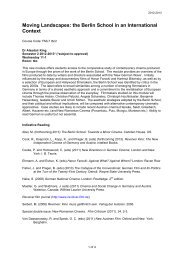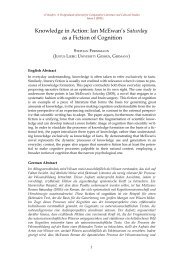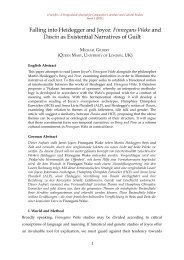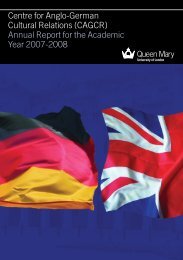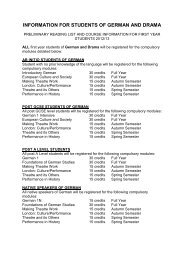Student Handbook - The School of Language, Linguistics and Film
Student Handbook - The School of Language, Linguistics and Film
Student Handbook - The School of Language, Linguistics and Film
You also want an ePaper? Increase the reach of your titles
YUMPU automatically turns print PDFs into web optimized ePapers that Google loves.
challenge, the way in which they throw light on a society’s culture <strong>and</strong> history. It also means<br />
learning what is specific to the medium: to underst<strong>and</strong> the various visual ‘languages’<br />
employed in cinema or the various forms <strong>of</strong> writing that can be found in novels, plays,<br />
philosophical works, <strong>and</strong> so on. To study linguistics is to underst<strong>and</strong> how language in<br />
general, <strong>and</strong> particular languages, actually work, as distinct from using them in practice: how<br />
languages have changed <strong>and</strong> are changing over time, how the study <strong>of</strong> language gives an<br />
insight into culture, society, the workings <strong>of</strong> the human mind. <strong>The</strong>se subjects can all be<br />
difficult, but they are not mysterious, <strong>and</strong> all <strong>of</strong> them will help you develop your skills <strong>of</strong><br />
analysis <strong>and</strong> self-expression in ways that will benefit your career, even if you work in a<br />
completely different area.<br />
In making your choice <strong>of</strong> modules, you have to take account <strong>of</strong> the requirements <strong>of</strong> the<br />
degree programme you are registered for, <strong>and</strong> <strong>of</strong> academic coherence (i.e. the different<br />
subjects you study should have some kind <strong>of</strong> relation to one another). You have an Adviser<br />
to help you make appropriate choices.<br />
You are expected to attend all classes, <strong>and</strong> to pursue your studies outside class during term<br />
<strong>and</strong> vacations. If you have to take a paid job, remember that you are still registered as a fulltime<br />
student, <strong>and</strong> must give your studies precedence.<br />
<strong>The</strong> above is a broad introduction, to give you a general idea <strong>of</strong> what is involved in your<br />
degree. But you will need more precise information, which is given below.<br />
2.1 PLANNING YOUR DEGREE<br />
Queen Mary Academic Credit Framework (“QMACF”)<br />
<strong>The</strong> College operates under its Academic Credit Framework, which is in line with national<br />
norms. <strong>The</strong> QMACF ensures that your degree is easily recognisable worldwide by<br />
reference to the National Qualifications Framework, as set out by the UK’s Qualifications<br />
<strong>and</strong> Curriculum Authority.<br />
In the College’s terminology your overall degree (e.g. <strong>Film</strong> Studies; French <strong>and</strong> <strong>Linguistics</strong>;<br />
Hispanic Studies with Business Management) is called a ‘programme <strong>of</strong> study’. A specific<br />
element <strong>of</strong> study (e.g. French Feminist <strong>The</strong>ories; Spanish Cinema;) is a ‘module’. Each<br />
module is run by a ‘Module Organiser’, who is the member <strong>of</strong> staff responsible for all<br />
aspects <strong>of</strong> the module. In many cases, this will also be the sole teacher <strong>of</strong> the module, but<br />
some modules may involve more than one teacher. <strong>The</strong> Module Organiser is named in the<br />
Directory <strong>of</strong> Modules, <strong>and</strong> is the person to approach in case <strong>of</strong> any queries about the<br />
module.<br />
Each module has a weight or ‘credit’ value attached to it, which is a multiple <strong>of</strong> 15. <strong>Student</strong>s<br />
choose combinations <strong>of</strong> modules up to the required value <strong>of</strong> 120 credits per year. <strong>The</strong>re is a<br />
programme specification for each programme <strong>of</strong> study which will inform you <strong>of</strong> the<br />
requirements you must meet in order to qualify for a degree in a particular subject. <strong>The</strong>se<br />
are on the website at http://www.sllf.qmul.ac.uk/undergraduate/programme_regulations.html<br />
Of the modules available, most are valued at 15 credits. <strong>The</strong>se generally run for one<br />
semester <strong>and</strong> require a quarter <strong>of</strong> your time for that semester. (Note that only a part <strong>of</strong> this<br />
time will be spent in classes; most <strong>of</strong> it will be spent on self-directed study.) Some modules<br />
are valued at 30 credits. Generally, these last all year <strong>and</strong> require a quarter <strong>of</strong> your time<br />
during each semester.<br />
During their compulsory period abroad, language students are required to complete a Year<br />
Abroad Assessment, which may be a single project, or a Learning Log, or be formed from<br />
the results <strong>of</strong> the examinations at their host university (see § 6 YEAR ABROAD AND YEAR<br />
11



